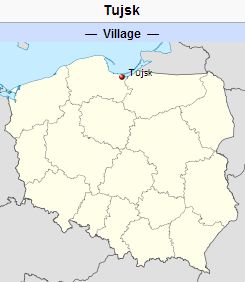Difference between revisions of "Tiegenort (Pomeranian Voivodeship, Poland)"
| [checked revision] | [checked revision] |
(Rejected the last text change (by SusanHuebert) and restored revision 124035 by RichardThiessen) |
m (Text replace - "comprised of" to "composed of") |
||
| Line 7: | Line 7: | ||
Tiegenort was established in 1349 by Heinrich Dusemer von Arfberg, Grand Master of the Teutonic Knights. The village was colonized in the 17th century. Until 1793 Tiegenort was part of Danzig in Royal Prussia (also known as Polish Prussia) in the Kingdom of [[Poland|Poland]]. The Second Partition of Poland in 1793 added Danzig and its surrounding territory to the province of [[West Prussia|West Prussia]]. Tiegenort was situated in the district (Kreis) of Marienburg from 1818 until the establishment of the [[Danzig, Free City of|Free City of Danzig]] in 1920. Tiegenort came under the control of Nazi Germany during World War II until February 1945 when it was occupied by Soviet forces and eventually returned to Poland. Today it is a village in the administrative district of Gmina Stegna, within Nowy Dwór Gdański County, Pomeranian Voivodeship. | Tiegenort was established in 1349 by Heinrich Dusemer von Arfberg, Grand Master of the Teutonic Knights. The village was colonized in the 17th century. Until 1793 Tiegenort was part of Danzig in Royal Prussia (also known as Polish Prussia) in the Kingdom of [[Poland|Poland]]. The Second Partition of Poland in 1793 added Danzig and its surrounding territory to the province of [[West Prussia|West Prussia]]. Tiegenort was situated in the district (Kreis) of Marienburg from 1818 until the establishment of the [[Danzig, Free City of|Free City of Danzig]] in 1920. Tiegenort came under the control of Nazi Germany during World War II until February 1945 when it was occupied by Soviet forces and eventually returned to Poland. Today it is a village in the administrative district of Gmina Stegna, within Nowy Dwór Gdański County, Pomeranian Voivodeship. | ||
| − | In the 1793 Danzig census there were four Mennonite families in Tiegenhort with the following surnames: Borckmann, Loepp, and Penner. In 1820, Tiegenort/Freiheit had 315 residents, including 24 Mennonites. In 1885, the village was | + | In the 1793 Danzig census there were four Mennonite families in Tiegenhort with the following surnames: Borckmann, Loepp, and Penner. In 1820, Tiegenort/Freiheit had 315 residents, including 24 Mennonites. In 1885, the village was composed of 231 włókas (4,148 hectares), 43 houses, 334 Catholics and Lutherans, and 15 Mennonites. |
Mennonites who were residents of Tiegenort were members of the [[Tiegenhagen (Pomeranian Voivodeship, Poland)|Tiegenhagen]] Mennonite Church. | Mennonites who were residents of Tiegenort were members of the [[Tiegenhagen (Pomeranian Voivodeship, Poland)|Tiegenhagen]] Mennonite Church. | ||
Revision as of 15:00, 5 May 2015
Tiegenort (Tiegenorth; now known as Tujsk; coordinates: 54.276667, 19.132778 [54° 16′ 36″ N, 19° 7′ 58″ E]; population in 1905, 503; in 2012, 362) is located approximately 7 kilometres (4 miles) north of Nowy Dwór Gdański (Tiegenhof), 20 km. (13 mi.) north-west of Elbląg (Elbing), 27 km. (17 mi.) north of Malbork (Marienburg), and 34 km. (21 mi.) east of the regional capital Gdańsk (Danzig).
Tiegenort was established in 1349 by Heinrich Dusemer von Arfberg, Grand Master of the Teutonic Knights. The village was colonized in the 17th century. Until 1793 Tiegenort was part of Danzig in Royal Prussia (also known as Polish Prussia) in the Kingdom of Poland. The Second Partition of Poland in 1793 added Danzig and its surrounding territory to the province of West Prussia. Tiegenort was situated in the district (Kreis) of Marienburg from 1818 until the establishment of the Free City of Danzig in 1920. Tiegenort came under the control of Nazi Germany during World War II until February 1945 when it was occupied by Soviet forces and eventually returned to Poland. Today it is a village in the administrative district of Gmina Stegna, within Nowy Dwór Gdański County, Pomeranian Voivodeship.
In the 1793 Danzig census there were four Mennonite families in Tiegenhort with the following surnames: Borckmann, Loepp, and Penner. In 1820, Tiegenort/Freiheit had 315 residents, including 24 Mennonites. In 1885, the village was composed of 231 włókas (4,148 hectares), 43 houses, 334 Catholics and Lutherans, and 15 Mennonites.
Mennonites who were residents of Tiegenort were members of the Tiegenhagen Mennonite Church.
Bibliography
Stowarzyszenie Konserwatorów Zabytków. "Tujsk." Catalogue of Monuments of Dutch Colonization in Poland. 2005. Web. 6 December 2012. http://holland.org.pl/art.php?kat=obiekt&id=466&lang=en.
Wikipedia. "Tujsk." Web. 6 December 2012. http://en.wikipedia.org/wiki/Tujsk.
Wolf, Hans-Jürgen. "Familienforschung in Westpreußen." Web. 6 December 2012. http://www.westpreussen.de/cms/ct/ortsverzeichnis/ortssuche.php.
Maps
Map:Tujsk, Pomeranian Voivodeship, Poland
| Author(s) | Richard D Thiessen |
|---|---|
| Date Published | December 2012 |
Cite This Article
MLA style
Thiessen, Richard D. "Tiegenort (Pomeranian Voivodeship, Poland)." Global Anabaptist Mennonite Encyclopedia Online. December 2012. Web. 25 Nov 2024. https://gameo.org/index.php?title=Tiegenort_(Pomeranian_Voivodeship,_Poland)&oldid=131872.
APA style
Thiessen, Richard D. (December 2012). Tiegenort (Pomeranian Voivodeship, Poland). Global Anabaptist Mennonite Encyclopedia Online. Retrieved 25 November 2024, from https://gameo.org/index.php?title=Tiegenort_(Pomeranian_Voivodeship,_Poland)&oldid=131872.
©1996-2024 by the Global Anabaptist Mennonite Encyclopedia Online. All rights reserved.

